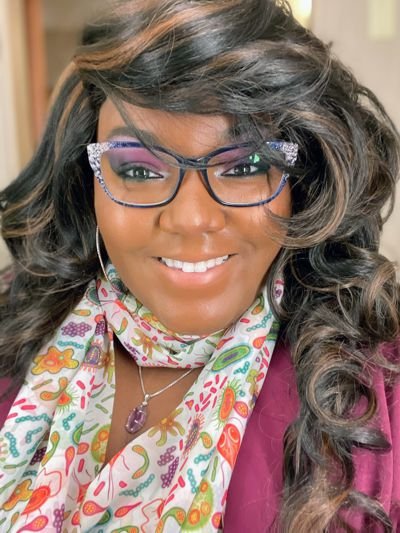“I was always the type of kid who was asking questions, which I’m getting payback for from my own son, which my mom often finds hilarious.”
– Ari Kozik
“I’m a therapeutic creative,” says Ariangela Kozik, PhD. “The things I like to do outside of work are in the arts. I love to paint, dabble in clay, and I even enjoy baking.” Ari is a musician from a musical family, and she and her husband met in marching band as teenagers.
Kozik designed the logo on her KoziMicrobe website, where she introduces herself as a U-M microbiologist and research investigator. She co-founded the Black Microbiologists Association and is interested in the human microbiome, systems biology, and inflammatory disease.
Growing up in northwest Indiana, Ari was encouraged into science by her parents who were supportive of her curiosity, helping provide experiences that revolved around whatever her latest interests were. At a young age when Ari was into rocks, her mom would take her somewhere to explore and dig in the ground to gather more for her collection. After rocks it was plants, and her mom would help her sprout orange seeds, mango seeds, and tomato seeds on wet paper towel all over the kitchen counter, just to see what would grow.
“I was always the type of kid who was asking questions, which I’m getting payback for from my own son, which my mom often finds hilarious,” says Kozik.
As her curiosity grew, Ari and her mom would visit stores with “sciencey stuff” and get petri dishes to study which dish soap worked best, media to grow bacteria, and a microscope for her 8th birthday. “I could make a little slide, stain it, and chop slices off things to see what it really looked like,” says Kozik. “Science has always been really important to me in helping understand the world around me, which drives my curiosity even more. If you want to understand how things work, why things are they way they are, science can help find a way to make things better.”
Ari considers herself a lifelong scholar. She loves to read and learns just for the sake of learning, not any particular topic. She is multilingual, introverted, and is fascinated by how science and art blend in her brain. In high school, she loved learning about psychology and what it means to be human. Then in college, she started narrowing down her interests and when she learned about the microbiome, that was it for her.
Discovering that there are viruses that infect bacteria called phages, that there are trillions of microbes living in and on the human body and are vital for a healthy life, and that very little is known about them, were all fascinating to Ari. She decided to research them and help fill the gaps between the known and unknown.
The Michigan Institute for Clinical & Health Research (MICHR) has been supporting Ariangela along her research journey, including their Postdoctoral Translational Scholars Program (PTSP). “I think my first formal interaction with MICHR was their Mock Study Section, nearly a full year before I anticipated putting in a grant, which was a good choice,” said Kozik. “It’s like no other place on campus and there are really nice people willing to take the time to provide wrap-around support, including reviewing my grant applications, providing excellent professional development, expanding my horizons, and building my confidence as an independent scientist.”
Another aspect of Ari’s research is with asthma and how not everyone’s asthma or response to treatment is the same, and how we don’t know why triggers are different from person to person. Looking at the microbiome in the respiratory tract, which wasn’t discovered until recently even though we are constantly breathing air, microbes, and particles in and out of our body, is something she finds fascinating. She is also exploring why communities of color are disproportionately affected by asthma, and other health disparities related to COVID testing and treatment.
She is very proud that she has persevered in her career with so many challenges, including the pandemic. “It was challenging but also galvanizing, because it brought the public face-to-face with microbiology in a way we haven’t seen in a century,” explained Kozik. “Unfortunately, the response has been all over the spectrum between scientific literacy and so much mis- and dis-information, but it was a wakeup call for me, my colleagues, and all scientists to mobilize quickly to solve the problem.”
Looking ahead, Ari wants to work along a wider area of the translational research spectrum, from the empirical biomedical work to influencing treatment of illness to improve human health. Her advice for other researchers it to never stop asking questions. “There is a kind of freedom in realizing that as scientists we not only don’t have all the answers, we may actually know far less than we think we do,” Kozik concludes. “This means there are so many opportunities for discovery, making it part of the challenge and part of the fun.”
This optimism and sense of wonder is informed by Ari’s artistic self. “I've noticed in thinking about science that there's a lot of overlap in looking at nature, music, and art, which all blend together in my brain. There is also a kind of freedom in art and music that sparks fearlessness – the use of textures and colors and sounds to create anew – I think it’s relevant to scientific curiosity, and I love that.”

